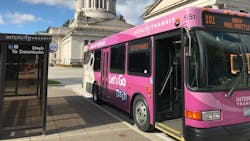Intercity Transit floats zero-fare demo project in Olympia, Wash.
A proposed five-year fare-free pilot project will be the subject of a Nov. 20 public hearing for the Intercity Transit Authority in Olympia, Wash. A vote will then be held on the zero-fare demonstration project on Dec. 4, which, if passed, would see the project’s launch begin on Jan. 1, 2020.
The zero-fare system would eliminate fare collection on buses and Dial-A-Lift, which Intercity Transit believes would increase access to those services, reduce travel times and eliminate the need to replace outdated fare collection equipment.
Intercity Transit Proposition 1 was approved in 2018 by the community to expand transit services within the agency’s service area which includes Lacey, Olympia, Tumwater and Yelm. That expansion includes nine specific service enhancements that would make the transit system “transformational.” The agency says it has already implemented 60 percent of those improvements, including earlier and later service, improved frequency, service to new areas and enhanced facilities.
A zero-fare system was determined to be the most efficient and economical way to achieve the transformational transit system following evaluation of new fare collection technologies and other options. Intercity Transit notes that transitioning to zero-fare would not require any additional public investment or result in any service cuts.
According to General Manager Ann Freeman-Manzanares, zero-fare offers distinct advantages over alternative fare structures. Most notably, systems that institute zero-fare programs have experienced ridership increases from 20 to 60 percent.
“It’s clear the community has bigger plans for transit. They want us to move more people more quickly and reduce congestion. Frankly, zero-fare is probably the least expensive and most efficient way we can accomplish those goals,” said Freeman-Manzanares.
The authority says the consideration to go fare-free comes out of fiscal and practical concerns. The authority explains that it would cost millions to replace obsolete fare collection boxes or move to an integrated e-fare system. Additionally, fare collection takes time as people search for the right change and it creates barriers for riders.
Intercity Transit Authority Chair Debbie Sullivan noted, “Replacing the fare collection system doesn’t make sense when the community is telling us to reduce barriers, increase ridership and make service faster.”
About the Author

Mischa Wanek-Libman
Group Editorial Director
Mischa Wanek-Libman is director of communications with Transdev North America. She has more than 20 years of experience working in the transportation industry covering construction projects, engineering challenges, transit and rail operations and best practices.
Wanek-Libman has held top editorial positions at freight rail and public transportation business-to-business publications including as editor-in-chief and editorial director of Mass Transit from 2018-2024. She has been recognized for editorial excellence through her individual work, as well as for collaborative content.
She is an active member of the American Public Transportation Association's Marketing and Communications Committee and served 14 years as a Board Observer on the National Railroad Construction and Maintenance Association (NRC) Board of Directors.
She is a graduate of Drake University in Des Moines, Iowa, where she earned a Bachelor of Arts degree in Journalism and Mass Communication.
